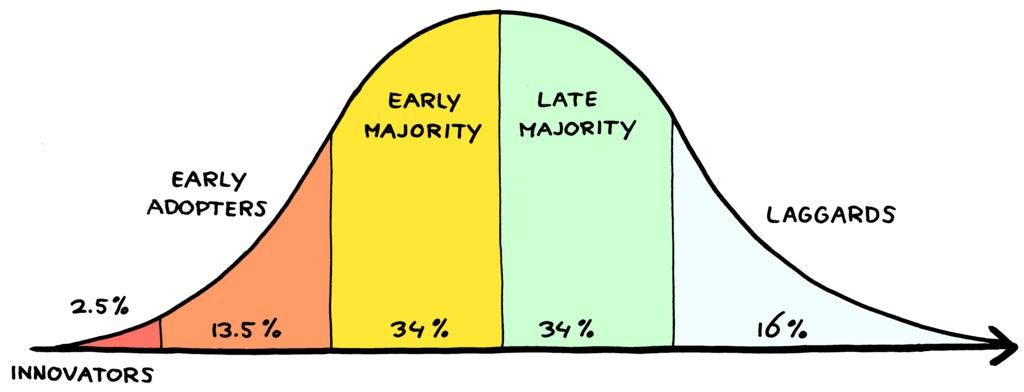I’ve worked with thousands of real estate agents for over 15 years. I’ve also been directly involved in the creation of innovative technology for over 15 years. This gives me a unique perspective into both worlds.
I’d like to share my thoughts on where the industry is headed, and ultimately try to empower you with what I believe will keep you successful.
This article is not meant to scare you, but rather provide some insight into the current state of technology and the potential realities of the future so that you can best prepare your business for the long-term.

The rise of automation, AI (artificial intelligence,) robotics, big data, and blockchain technologies are disrupting many of the jobs that we know and love. It’s becoming clear that certain jobs such as transportation will eventually be rendered obsolete — because a robot or AI will at some point do it better than a human 100% of the time.
Other jobs will most likely become dramatically different because of technology, but still exist and be done primarily by humans but enhanced with the assistance of technology. I believe real estate is in the latter camp, and I’ll show you why.
Are the Robots Coming for Your Job?
A study from Oxford University found that automation is projected to replace 50% of all current jobs in the next two decades. The same study predicts automation is 86% likely to replace traditional “real estate sales agents” and 97% likely to replace “real estate brokers”.
Brad Inman, founder of Inman news, was also quoted saying “90% of what’s done by a REALTOR® will be in the hands of AI within 5 years.”
Does this mean there’s no future for real estate agents? Not exactly. This does mean that the current way the industry works and how you do business will change.
Technology-native startups are always quick to identify opportunities in the market and meet that demand before larger, slow-moving companies notice or begin to change. Right now there are some really smart people actively trying to replace the MLS® with a free, global listing network based on blockchain technology (popularized by Bitcoin,) trying to replace REALTORS® with an app, offering partially refundable, discount/flat-fee (or “a-la-carte”) real estate services, make instant offers online, and so much more.
Note: A lot of these types of companies haven’t made their way up North yet.
[-_-]~~ Ninja Sidebar:
What on earth is blockchain technology?
We can see this disruption also happening in many industries that traditionally rely on an intermediary between buyers and sellers in a marketplace. In the financial services industry traditional investment options are being ditched – mostly by the upcoming generation – for hybrid solutions where humans work with the assistance of AI for a reduced fee (for example Wealthsimple, Betterment, Wealthfront.)
Having said that, a large portion of the population will not switch from a traditional wealth manager to an AI (or an AI-assisted one) overnight. The change will follow the “law of diffusion of innovation” as with anything new.

Currently in Canada (especially in places like Vancouver) real estate ownership rates are low among millennials simply because of the high cost of buying a home. As it currently stands, most real estate agents are over the age of 50, and their clients are too. Older agents working with older clients are less susceptible to these changes, but they too will need to adapt to changing technology as more and more new agents compete for their business.
Yes, the Robots ARE Coming for Your Job… (But Only the Boring Parts)
When you examine professions that will be exceptionally hard for artificial intelligence or a machine to do better than a human, the result tends to lean towards ones which require a unique combination of human intuition, creativity, reasoning, empathy and emotion… less so on repetitive/redundant tasks, compliance, transactions, data-entry, etc.
A large portion of a REALTORS® time is currently spent doing paperwork, entering data, transferring data, crunching numbers and other administrative type tasks. These are the aspects of your business which will become simplified and eventually automated.
Complex technical problems can be solved by complex technical machines, but what separates humans from machines is where the real opportunity is. Primarily transactional brokers looking to remain in the industry long-term should consider this now.
REAL VALUE: Focus on the Bigger Picture
Once upon a time, real estate agents were the gatekeepers of real estate listing data. As you know, that all changed with the internet and the publicly accessible MLS®. This empowered consumers with lots of information about a particular neighborhood, local schools and other things that matter when trying to make an informed decision.
Currently in Canada, home buyers are not able to access SOLD listing information without the assistance of an agent. That may change soon in Toronto, and once that happens it’s not unrealistic to expect other boards to follow suit.
![]()
With this abundance of data, being able to understand what that data means and how it pertains to individual situations is everything. That’s what won’t be replaced by a robot.
Ask anyone who’s ever bought and sold a home – especially as their primary residence – how the journey was. They will most likely tell you it was one of the most emotional, stressful moments of their life.
People are very sensitive regarding their money and their home… and buying/selling/moving affects every aspect of life including family, finances and often times career. It’s human nature to freak out a little when your life suddenly changes; that aspect of the equation will never change. People are not always thinking rationally during these times, and the need for a trusted, experienced advisor will always remain relevant.
How often does a buyer give you a list of “must haves” and you show them a property which technically matches their requirements, but they say “NO” as soon as they walk in the door? The more you work with people the more you start to understand that reason and logic are not the primary drivers of their decisions.
An experienced real estate agent will often explore beyond the data to help their client find the right home.
Trust is everything when it comes to big, scary decisions. Building and maintaining trusting relationships is your number one weapon against automation taking your job. People want to work with other humans they trust.
What Does This Change Look Like?

When used correctly, technology will not break your hard-earned relationships, but rather allow you to spend more of your time fostering them and less time doing busy-work.
You’re most likely already leveraging technology that makes your life and your job simpler. Can you imagine doing this job without your smart phone? It makes you wonder how on earth any work ever got accomplished before…
Technological advancement has and will continue to impact many parts of your job, for example:
- REALTOR® website software companies (shameless plug: like RealtyNinja!) that let you focus on your business with your website on autopilot, or really easy to update if you wanted to.
- Clients already having information on sales history, local demographics and estimated home values.
- AI-powered chatbots allowing you to pre-qualify prospective leads by answering time-draining generic queries about properties.
- Being able to target and segment your marketing efforts thanks to Social Media, Google Adwords and other platforms.
- CRM software letting you keep track of all your conversations, clients, prospects, deals, etc. without piles of paper on your desk.
- Appointment setting and calendar services making scheduling much easier.
- Virtual reality hardware getting cheaper and better, where you’ll be able to provide potential buyers with a virtual walkthrough of their next home even if it’s just a big hole in the ground right now.
- Augmented reality letting your clients “see” what their empty room would look like if it were renovated or staged for sale.
- Video and streaming technology getting to the point where you can record a video in 4K, edit it on your phone and upload it to your YouTube channel within minutes, then share it with thousands of people.
- Drones and DSLR cameras getting better, cheaper and easier to operate.
- Dotloop and other services taking the headaches out of your transactions.
- Free or affordable marketing automation tools such as Mailchimp handling what used to take you days at the print-shop or post office.
- Smart devices allowing a prospective buyer to tour a property on their own, or with the assistance of a virtual agent.
- The list goes on…
Key Takeaways to “Future-Proof” Yourself
I hope reading this article has given you a bit of relief but also motivated you to keep improving your business to stay competitive. At the end of the day, it all comes back to these basic principles:
- Don’t believe all the doomsday “rise-of-the-robots” hype – but have a realistic understanding that everything eventually changes and it’s better to stay ahead of it.
- Focus on your clients needs, well beyond their technical/informational requirements.
- Become an expert in your specific niche, apart from what information can be found online.
- Build your network and spend plenty of time maintaining your relationships.
- Continually improve your knowledge of technology and learn from those using it right.
- Have an open mind to changes and technological disruption, and look for opportunities to leverage them.
Feedback?
If you enjoyed this article, or if you hated it, I’d love to hear your feedback in the comments below. Thank you!




